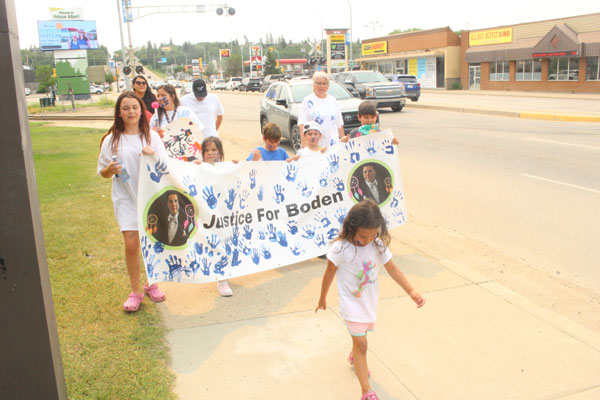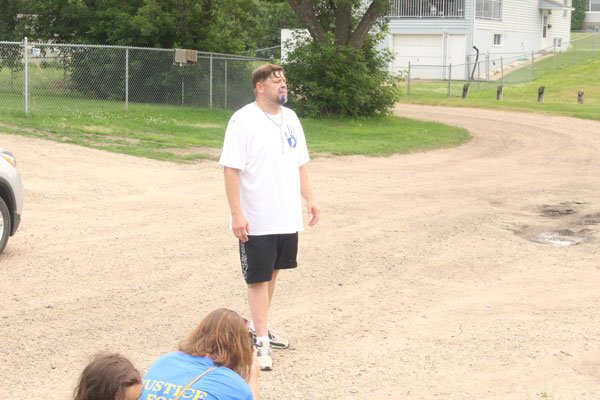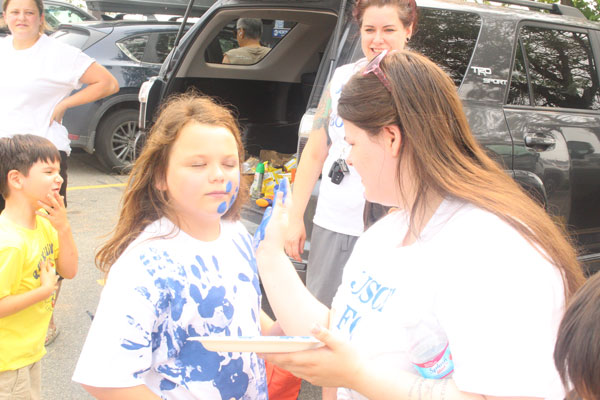
An exercise in healing for family and friends of Boden Umpherville concluded with an awareness and memorial walk on Saturday in Prince Albert.
The walk had symbolism of blue handprints and blue signs and signs remembering Umpherville.
On Thursday and Friday, members of Umpherville’s family were at the Prince Albert Legion working on a project that investigated experiences of “over-protection” or “under-protection” by police.
The project is by a team of researchers from the University of Saskatchewan. Julie Kaye an associate professor at the University of Saskatchewan explained that that the researchers have been holding art space workshops.
The first day on Thursday was for close family and intimate relations and the second day was a wider workshop.
“Over the last couple of days we’ve done some painting of some rocks and things to memorialize both Boden as well as other loved ones, creating some of these T-shirts, (and) some paint work,” Kaye said.
The university has similar research events before in Saskatoon, and Kaye said each one looks a little different. For this event, the idea for the walk came from Umpherville’s family.
“The family wanted is to memorialize the passing of Boden and to memorialize his killing,” Kaye explained. “What they really wanted was to be able to host a walk.”

Advocate Chase Sinclair speaks at the location where the incident occurred on April 1, 2023 at the conclusion of the Awareness Walk for Boden Umpherville on Saturday.

Before the Awareness Walk for Boden Umpherville on Saturday blue handprints were placed on participants faces.
The project is part of a wider project on racialized policing in the province. The larger project is under the direction of professor Scott Thompson.
“He has worked on a lot of data collection in terms of using practices around street checks and carding,” Kaye said. “He has a large data set of what he’s collected.”
Kaye then takes the data and leads the community-based work like the work with Umpherville’s family. She said it tries to connect what they see in policing data and what police are saying and documenting. They then connect that to community experiences.
“Part of the question is what relationship community would like to see with police moving forward,” she said.
Kaye and Thompson wrote a report on carding practices. The report focuses specifically on Saskatoon, and includes findings from their workshops.
Kaye explained that this was the second workshop of this type they had done. The researchers also held other workshops with families of Missing and Murdered Indigenous Women and Girls.
Chase Sinclair has been advocating for Umpherville ever since the incident and his death 15 months ago. Sinclair said he is not a bloodline relative but the pair were brothers.
“I grew up with him since I was a kid,” Sinclair said.
Umpherville was arrested on April 1, 2023 and Umpherville was taken off life support about three weeks later.
A news release from the Saskatchewan Serious Incident Response Team (SIRT) said Umpherville was one of three people in a vehicle police pulled over. Although the car had been reported stolen, according to police, one of the people inside was the registered owner.
Prince Albert police used stun guns, collapsible batons and pepper spray during the arrest, according to SIRT. The SIRT report has not been released.
PAPS members stopped the vehicle Umpherville was riding in at 2:23 a.m. on April 1 in the 1100 Block of 13th Street West. Witnesses report Umpherville was in the driver’s seat of the vehicle.
Sinclair said the two days before the walk were about healing. On Thursday that was the most specific thing that happened, according to Sinclair. He said that they were able to talk about what happened in a safe space.
“We were just able to release some feelings, so it was healing in a sense, and we definitely need that. We need to continue needing that, which is why we need this closure of something so that we can put some put a staple in it and then just move on with life. But we’re not there yet. Apparently, we’re two years away,” Sinclair said.
He said it was great to be able to get together because that does not happen often.
He said that the second day was for youth and educating them how to interact with law enforcement. He said that people who come from a disadvantaged background are labeled as criminals.
“We are hurt people we didn’t deserve to live in this world that we were just born into it. So we have the tools out here to do what we can with it and this is what it is,” Sinclair said.
He said that actions like that are what Umpherville would have done. Sinclair explained that he has served time but has now taken advantage and begun to work to help the community.
“But instead I went to school and I’m making a difference with this, I’m finishing my social work degree this year and I’m going to keep fighting for our people,” he said.
The symbolism for the walk and the art-based project was blue handprints. Sinclair explained that he had permission to use the handprint symbol from advocates for MMIWG. He added that blue is both a symbol of male colour and a colour that symbolizes police.
“Law is kind of associated with the blue police and also the handprint is already iconic and so there there’s indigenous men that are murdered and missing at the same rate as Indigenous women, except it’s out in the open and nobody’s doing anything about it and that’s why we are here,” Sinclair said.
At the site where the incident happened Sinclair made a speech about the incident. Sinclair then delivered a fern with special symbolism to Deputy Police Chief Farica Prince at the main Prince Albert Police Station. At each stop there was a drum group who played and an opportunity to smudge.
The walk began at the Gateway Mall and then went up Second Avenue and crossed the street ending up at River Street, from there it went down to the place where the incident happened on 13th Street West. At the location the group left a memorial of the painted rocks from the workshop.
Because of the heat of the day the people who returned on the walk were gradually picked up as they made their way back.
The walk was supposed to start at the Prince Albert Legion but the group was forced to change venues after being asked to leave by the Legion.
“We just got removed from a Legion. We got kicked out of our last building that we were at and they said that we have to get out because we’re (The Legion) not supporting anybody that talks against the police,” Sinclair said.
He explained that he is advocating because he wants better futures for youth.
“Kids are coming up in this world behind us and it could be them getting killed. It could be them incarcerated for things that they didn’t do. It could be them not getting the proper supports in the community,” Sinclair said.
He said that it is not just law enforcement but the entire community that needs to understand. He pointed to under representation in healthcare and inequities in the education system.
“We come here to urbanize and everybody has already has a stereotype of the bad Indian or the bad this or the bad that. We need to fix that. We just need to be community outside of
color, outside of culture and just love each other. That’s what this is about is building love, building a community,” Sinclair said.
Sinclair said that people are afraid to speak out and gave the example of friends who were not present for the walk.
“Why isn’t there anybody here? Why doesn’t the community care that people are being jailed every day for things that they didn’t do or things that we could prevent. Where is the restorative justice,” Sinclair said.
He added that it was the community that could fix the issue and it was not just a Prince Albert problem but a problem across Canada.
“When the community is whole, then maybe then another city will follow and then another city and then it expands,” Sinclair said.
Sinclair described Umpherville as a protector and leader who had his life cut short.
“He had potential and he would have been a beacon for this community, he would have been a beacon of hope, a chance to change.”
Kaye expressed the same sentiments about Umpherville.
“One of the things I heard a lot about Boden over the last few days is that he was a protector and so part of the idea is also we’ve got a lot of little ones that will be around and (we’re) creating spaces to protect them moving forward,” Kaye said.
The workshops were funded by the Saskatchewan Human Rights Commission and the Social Sciences and Humanities Research Council of Canada Explore Grant.
michael.oleksyn@paherald.sk.c

